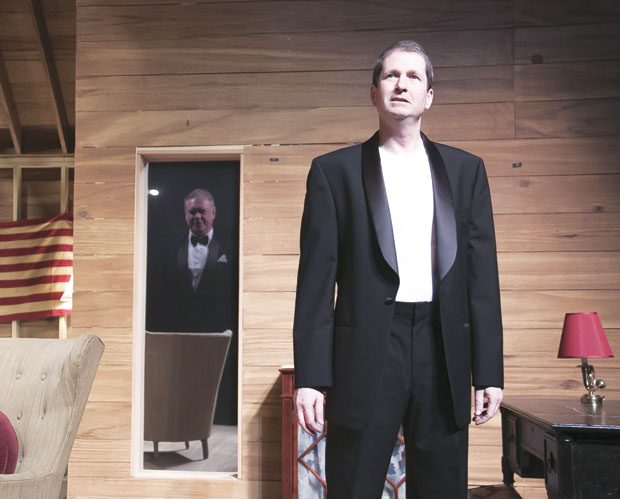Father-son matters resonate onstage & off for Stan Graner

GHOST DAD | Father-son issues in ‘Black Tie’ resonate in the personal life of actor Stan Graner, right. (Photo courtesy Mark Oristano)
 Stan Graner knows from experience that experience puts you in the know.
Stan Graner knows from experience that experience puts you in the know.
When Graner first started performing in theater, he was entirely dedicated to musical comedy roles. After 20 years of that, however, he began to worry.
“I didn’t want to become the aging chorus boy,” he recounts. About 10 years ago, he starting honing his acting craft, studying the Meisner Method with director/coach Terry Martin and exploring opportunities in non-musical theater.
And the effort has paid off. Graner has become a go-to guy for middle-aged character parts — and the occasional leading man, which he tackles in the current production at WaterTower Theatre, A.R. Gurney’s Black Tie.
“I am thrilled that straight plays — if you’ll forgive the expression — have a place for me. Even though this a light comedy, I like the mechanics of the humanity [it portrays], the interactions of the people,” he says. “It’s clever in the best sense.”
In Black Tie, Graner plays Curtis, a father preparing for his adult son’s wedding, when suddenly his own father shows up — ordinarily nothing remarkable, except his dad has been dead for 10 years. And his ghost has some advice.
Gay men typically have complicated relationships with their fathers, and Graner is no exception, something that fueled his interpretation.
“The show resonates in my own life,” Graner says. His mother passed away last year, and he has recently begun to manage finances for his own 87-year-old father. When he came out to his parents in the 1980s, after the initial shock, they became wholly accepting. So he likes the fact his character in Black Tie is empowered to deal with his dead dad from a position of added understanding.
“Curtis is ready to listen to his father and let him help do things right,” he says. “[The reappearance of his father] allows his subconscious to say things his normal conscious mind would never acknowledge.”
He credits the show’s director, Rene Moreno, with helping him plumb different levels of his character as well.
“I could just make this an advertisement for Rene,” he says about his affection for Moreno. “He’s so collaborative. But in general, I am at a place where every director I get to work with is at the top of his or her game.”
Just another benefit that comes with age.
This article appeared in the Dallas Voice print edition June 7, 2013.

